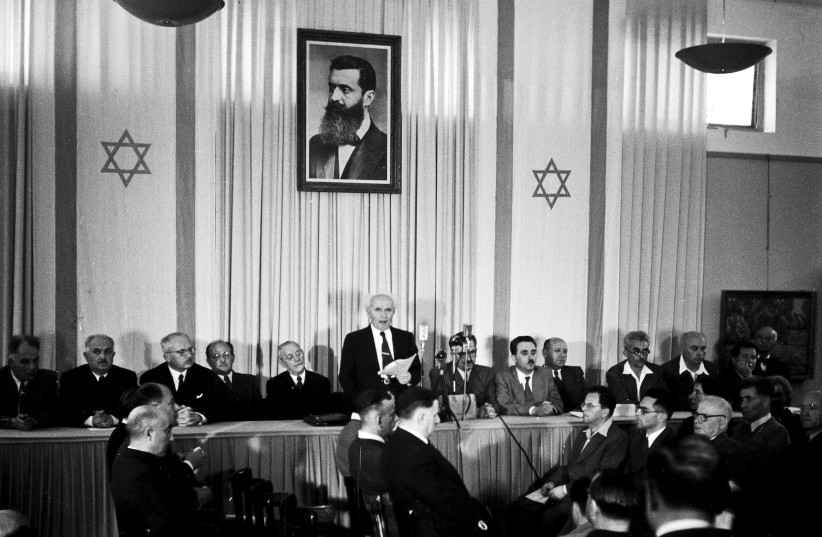Most Zionists would tell you the goal of the Zionist movement was to return the Jewish people to the historic homeland of the Jewish people, the land of Israel.
Zionist scholars would agree that returning the Jewish people to their land was a major element of the Zionist platform, there was a more pressing issue facing the Jewish people – sovereignty.
The Jewish people were facing persecution in many of their adopted lands. Zionist leaders knew the only way they could ensure Jewish security was by establishing a Jewish state where Jews would determine their own future.
The establishment of a Jewish state
With the establishment of the State of Israel in 1948, Jews finally had the ability to determine their own destiny, protect themselves from foreign enemies, and ignore other nation’s pressure.
When the Jewish state was founded in May of 1948, the Arab states and their allies began attempts at the United Nations to limit Israel’s sovereignty.

Israeli ambassador Abba Eban and future prime minister Moshe Sharett worked day and night, refusing to give an inch, to convince the nations of the world that Israel’s sovereignty was sacrosanct. Sovereignty allows the Jewish people to live freely in the ways they think best for themselves.
There are critics of Israel who see sovereignty as more than a life-saving necessity for the Jewish people, they also see it as a responsibility.
These critics maintain that as a sovereign nation the Jewish people are responsible for anything that happens under their rule.
Sovereignty over a territory means that anything that happens to anyone living in the territory that nation rules is the governing nation’s obligation to care for and solve.
They maintain that even in war time, when the enemy’s territory comes under another country’s rule, that country, the occupier, is responsible for the new territory as if it was a part of the homeland.
Critics of Israel take this theory of expanded responsibility and apply it to Israel’s war against Hamas in Gaza.
They claim that everything that happens when Israel is at war is Israel’s responsibility. A few weeks ago, Israeli soldiers brought humanitarian aid into the Gaza Strip.
For their own safety, and in line with international military standards, the IDF soldiers set up a safety perimeter to protect themselves and the Palestinian people from rioting. As much as they tried, the Palestinians rushed the aid convoys – and the Israeli soldiers.
With no choice the Israeli soldiers fired at Palestinians rushing them. Rioting ensued and over a hundred Palestinians died, almost all from being trampled by other Palestinians.
The aforementioned viewpoints are critical of Israel and claimed the State of Israel is responsible and the government must take responsibility for the deaths of the more than 100 Palestinians of Gaza who died as they sought food for themselves and their families.
The causes of the Palestinians deaths – whether by trampling or the gunfire of soldiers who perceived a threat to themselves – doesn’t make a difference to these critics.
They maintain since the Palestinians died under Israeli control, it is Israel’s responsibility, and Israel should take the blame. These voices can even be heard within the broader Jewish – but not necessarily Zionist – community.
The position that requires Israel to take responsibility and blame for anything that happens under its rule is dangerous to Israeli security and a reflection of a perverted form of Zionism.
Jews must stop listening to critics who insist Israel pursues a weak-kneed self-flagellation by claiming as the powerful party they are responsible for everything that occurs in their region.
While Israel might govern various areas populated by different people, and at war might invade even more regions, they don’t control the people living in these areas and can’t be held responsible for their destructive actions.
The current war in Gaza is being waged because Hamas and other Palestinians chose to attack Israel and announce to the world that they are actively planning further attacks.
Deterring future attacks in self-defense became the Israeli government’s primary responsibility. Israel’s reaction to the attacks it suffered was easily foreseeable – as was the suffering the Palestinian people of Gaza would suffer as a result of the Hamas-started war.
Gazan Palestinians are not Israeli citizens and are not Israel’s responsibility. Israel didn’t want this war, Israel didn’t start this war, it doesn’t want it to continue.
The Palestinians can end this war simply by surrendering and returning the Israeli hostages they are holding. Poor choices made by Palestinians, from continuing the war, to rushing Israeli soldiers, to attacking aid trucks, are the sole responsibility of the Palestinians.
The fact of the just cause for Israel’s war against Hamas, and the villainy of the enemy requires the war to be fought victoriously.
There is no moral difference between the tragic but inevitable killing of civilians in wartime, especially those used as human shields by the enemy, and events like the one that transpired with the food trucks, the senseless violent deaths of civilians simply seeking the food that they are entitled to as human beings. They are both the responsibility of the party who started the war.
Victory for the State of Israel in this war, and for the Jewish people in fulfilling our moral aspirations, requires the preservation of our security as well as our humanity and the essential humanity of others.
Events like today deserve the world’s condemnation of our enemies , and our insistence that they never happen again. We have nothing to atone for in this incident or the countless others Hamas has brought on its own people.
The writer is a Zionist educator at institutions around the world and recently published a new book, Zionism Today.
